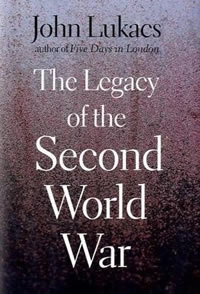Book Notes
 John Lukacs, The Legacy of the Second World War (New Haven: Yale, 2010), 201pp.
John Lukacs, The Legacy of the Second World War (New Haven: Yale, 2010), 201pp.
John Lukacs was born in Hungary to a Catholic father and a Jewish mother. The Hungarian army conscripted him into the army during its alliance with Germany, but Lukacs deserted and remained in hiding until the end of the war. Although grateful for the defeat of Germany, he was wary of Soviet "liberation." In 1946 Lukacs emigrated to the United States and landed a teaching job at Chestnut Hill College in Pennsylvania in 1947, a post he held until his retirement in 1994. In over thirty books, many about the "great men" and events of the Second World War, Lukacs established a reputation as a brilliant if idiosyncratic historian. He describes himself as a "reactionary" rather than a conservative, a patriot but not a nationalist, and considers populism as the worst threat to traditional civilization and values.
Lukacs describes this book as a "history about the history" of World War II. In particular, he's interested in the "gigantic, triangular struggle" between parliamentary democracies in Britain, America, and parts of Europe, Soviet communism, and German Nationalism, and the remarkable fact that it required an unnatural partnership between the first two to conquer the third. Indeed, Germany's threat was so severe that it took perhaps 500 million people from America, Britain, Europe, and Russia to defeat 80 million National Socialists. In six chapters Lukacs explores six questions about the place of the war, the division of Europe, Hitler, the role of Heisenberg and Bohr in building the atomic bomb, the American war plan called Rainbow Five, and the exact origins and nature of the cold war.
This is a book for specialists and not a general readership. Lukacs writes with a brilliant knowledge and assimilation of the sources, nuance, and complexity. But there are still gems that non-specialists can glean — like his reflections on the importance of nationalist ideas and ideals over material and economic factors, of how in October 1944 Churchill flew to Moscow where he and Stalin carved up a European map in a matter of minutes, about the possible "recrudescence of [Hitler's] reputation," of how, fortunately, the Rainbow Five war planners eschewed public opinion and prioritized victory over Germany instead of Japan, and, perhaps most important for our own time, the lurking dangers of extreme nationalisms.


